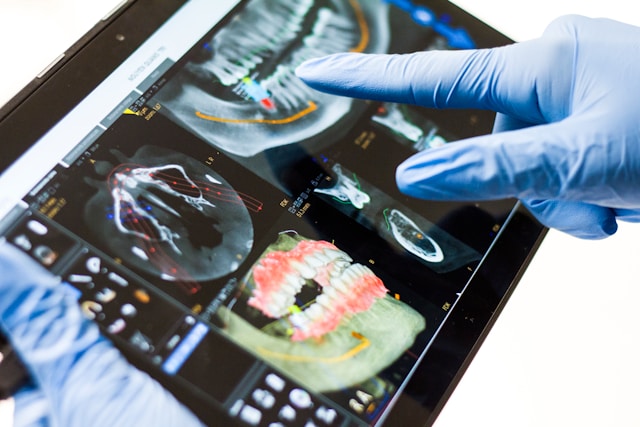Do you often experience facial pain and struggle to move your jaw, making it challenging to chew, speak, or open your mouth wide? Temporomandibular joint syndrome (TMJ) might be causing these issues.
While traditional treatments like oral appliances and physical therapy are common, a new treatment method called Botox is becoming quite a popular choice for TMJ treatment.
Here, we will cover everything you need to know about Botox for TMJ disorder.
What is TMJ?

The temporomandibular joint is like a hinge connecting your jaw to your skull. It allows you to move your jaw up and down, side to side, forward and backward, helping you talk, chew, and yawn. But if something goes wrong with the joint or the muscles around it, you might have temporomandibular joint disorder (TMJ).
TMJ disorder occurs when the joints in your jaw are damaged. It can cause facial pain, swelling of neck glands, and muscle spasms. While some people manage TMJ with changes in their daily routine and physical therapy, others seek newer TMJ therapy approaches to ease their long-lasting discomfort.
What are the Symptoms I May Notice When Dealing With TMJ?

It’s essential to know that only some with TMJ have the same symptoms, which might not be constant.
Some of these symptoms Include:
- Grinding teeth
- Headaches
- Trouble opening or closing your mouth
- Difficulty chewing
- Pain in your jaw, ears, neck, or shoulders
- Ringing in your ears
- Eye pain
- Swollen face
- Feeling dizzy
- Jaws gets stuck
- Dental problems
What Causes Temporomandibular Joint Disorder?

Although the exact causes of TMJ are unknown, a few things can make it more likely to happen.
Some common causes for TMJ include—
- Different kinds of arthritis can affect the jaw joint and lead to TMJ.
- Feeling stressed can cause TMJ by making the muscles in your jaw tight.
- Grinding or clenching your teeth can strain the muscles and damage the joint.
- Having a jaw injury.
- Sometimes, it might run in families, meaning it could be passed down from parents to kids.
What is Botox?

Botox is a popular treatment for smoothing out lines and wrinkles, but it’s not just for beauty purposes. Botox can also help with medical problems. Injecting Botox can relax muscles, which is why it’s been used to treat different muscle and nerve issues, like TMJ disorders.
How Does Botox Work to Treat TMJ Disorder?

When Botox is injected into the muscles around the temporomandibular joint (TMJ), it targets specific muscles responsible for jaw movement. In individuals with TMJ disorder, these muscles can become tight and tense, leading to pain and discomfort. Injecting Botox temporarily blocks the nerve signals that tell the muscles to contract, allowing the muscles to relax and decrease the tension in the jaw joint.
This relaxation of the jaw muscles can significantly relieve TMJ-related pain and discomfort. Patients often experience reduced jaw stiffness, improved mobility and diminished headaches associated with TMJ disorder. Moreover, Botox injections can also help prevent teeth grinding, medically known as bruxism.
Most individuals with TMJ disorder suffer from bruxism, which can increase TMJ symptoms and lead to further complications. Botox can effectively reduce the frequency and intensity of teeth-grinding by relaxing the muscles involved in grinding or clenching the teeth. This, in turn, helps to alleviate TMJ symptoms and promotes overall jaw relaxation.
Botox injections offer a dual benefit for TMJ disorder: They relax the jaw muscles, reduce tension in the joint, and prevent teeth grinding. This combination of effects can significantly improve the quality of life for individuals suffering from TMJ-related pain and discomfort.
However, it’s essential to consult with a qualified healthcare provider to determine if Botox injections are the right treatment option for your specific case of TMJ disorder.
The Procedure
Botox for TMJ disorder doesn’t require any surgery or hospitalization. The process is quite simple. Before getting the injections, your doctor will decide how much Botox you need. They’ll also give you instructions to follow before and after the treatment.
During the actual procedure, which lasts about 10 to 30 minutes, the doctor will inject Botox into specific areas like your forehead, temples, and jaw muscles, depending on your symptoms.
When you get the injection, you might feel a slight sting, like a bug bite or a tiny needle poke. If it bothers you, you can use a cold pack or numbing cream.
Benefits of Getting Botox for TMJ Disorder

When other treatments for TMJ haven’t worked well enough for you, doctors might suggest trying Botox.
It’s not just for easing jaw pain—it can benefit in many other ways like:
- Lessen severe symptoms
- Relax stiff muscles and reduce tension
- Treat teeth grinding
- Reduce anxiety
- Create a slimming effect
- Ease headaches and TMJ pain
- Improve sleep and relaxation
- Protect teeth and aid jaw movement
- Provide long-term symptom relief
- Require minimal downtime
Risks and Consideration

Although Botox injections are usually safe, it’s essential to have them done by a skilled professional because of some possible risks, such as:
- Allergic reactions
- Infections
- Pain or swelling where you got the injection
- Accidentally affecting nearby muscles
- Temporary weakness or drooping in your face
Am I the Right Candidate to Get a Botox for TMJ Disorder?

Talking with a healthcare provider is crucial to determine if Botox is right for you. However, the best candidates for Botox for TMJ problems are people who:
- Feel constant pain and tension from TMJ disorder
- Haven’t felt better with other non-surgical treatments
- Aren’t pregnant or breastfeeding
- Don’t have any neuromuscular diseases
How Long Does Botox for TMJ Last?

After a few days or weeks, you might start feeling better, and the best results usually show up about four to six weeks later. The effects of TMJ injections don’t last forever, just like Botox for wrinkles. It’s different for everyone, but the benefits usually last about three to five months.
Even though the effects don’t last forever, they’re helpful in the long run! Plus, when you combine Botox injections with splint treatment, you get long-lasting benefits.
Aftercare Tips for You to Follow
After getting Botox for TMJ, here’s what you might need to do:
- Keep your skin cool and dry.
- For a day or two sleep with your head a little higher than usual.
- Skip consuming alcohol or smoking for a while.
- Don’t rub or touch your face where you got the injections.
Suffering From TMJ Disorder? Get Your Botox Treatment at RiverRock Dental Today!

If you’re dealing with the discomfort of TMJ disorders, Botox could be a helpful option. It relaxes your muscles without surgery. Getting diagnosed and treated early is crucial to feel better and avoid problems later on.
At RiverRock Dental, we offer Botox to help you feel good and relieve pain. Our team of dental professionals are highly trained and continue to learn to give you the best care possible.
Are you ready to ease your TMJ symptoms? Book your appointment now!
Call us at (952) 445-5556 or contact us online.
FAQs
Does Botox help with clenching?
Yes, Botox can relax your jaw muscles to prevent clenching, often reducing chronic headaches and migraines.
How long does Botox last for teeth grinding?
Botox for teeth grinding usually lasts three to four months, but this can vary.
Does Botox work for TMJ?
Yes, Botox is effective for TMJ disorder, especially if you’ve had chronic pain for a long time.
When do you need Botox for TMJ?
Botox is recommended for TMJ if other treatments haven’t worked. Typically, it’s tried after self-care measures like warm compresses and night guards.
Is it safe to get Botox from a dentist?
Yes, dentists are trained in facial anatomy and muscles, making them qualified to give Botox injections safely.






